Guiding Student Learning Through Conferences Transcript
Speaker 1: I'm going to be calling some of you up for conferences today. During student independent work, I am able to meet students where they're at through routine conferences that happen frequently. How are you doing, David?
Male Students: Good.
Speaker 1: I'm not an expert on conferring. I'm reading a lot about it. Our district is trying to do a lot more, the purpose being to provide students with meaningful feedback that they can use to improve on their research skills and their ability to communicate effectively with peers or any audience.
Do you feel good about moving forward with this final section?
Male Students: Yes.
Speaker 1: My role today was to facilitate conferences with students around their Civil War projects, that's kind of a culminating project that will be presented at a gallery walk that's going to take place in the next week.
What's your topic?
Male Students: The Underground Railroad.
Speaker 1: The Underground Railroad. Oftentimes, conferring happens on a rotation. The questions that I use are really designs to put the student in the captain's seat of their conference, and it's really designed to have them do the majority of the talking.
Where would say on the continuum, where do you feel you're at as far as how far along we are to the final presentation?
The conferences I was administering today have a couple of elements to them. The first element is really just generally asking the students to point to where they're at in the development of their task.
Male Students: Right now, I would think of them as designing parts.
Speaker 1: The designing parts? Okay. Do you think you have enough research to be successful in the design page?
Male Students: Yeah.
Speaker 1: Do you want to walk me through what you're going to be including?
Male Students: How it was an event, where people secretly went up North to escape from slavery.
Speaker 1: The second step is really for them to articulate what they need to do to fulfill that particular step of the process.
Male Students: [inaudible 00:02:07] to make a story after I'm done.
Speaker 1: That's where I can kind of, I feel, diagnose how I can help get them to their desired goal, or their desired endpoint. So, it looks like your kind of approaching the design phase. How are you going to tell that story? What are you going to use?
Male Students: I have no-
Speaker 1: Do you remember ... well let's talk about some options that we have to tell a story. Do you think you would do it like a comic, or do you think you would do it more as like a narrative?
Male Students: Probably a comic.
Speaker 1: Like the comic was kind of fun?
Male Students: Yeah.
Female Student: I'm going to be doing a tri-fold-
Speaker 1: The final phase of the conference is to ask a process-oriented question. That's something that they can apply to any project that they do in any class. Do you feel like you've learned anything about yourself as a researcher throughout this process?
Female Student: Well, I've realized that when I'm researching ... going to kid sites, it's like already paraphrased for you.
Speaker 1: Finding the right material is a really important step.
Female Student: Mm-hmm (affirmative).
Speaker 1: I have a general conference log, but I try to really focus on the student when I'm conferring. I can take notes as soon as the conference is over in a way that it can help inform the next conference that I'm going to have with that student.
How are you?
Speaker 4: Good, how are you?


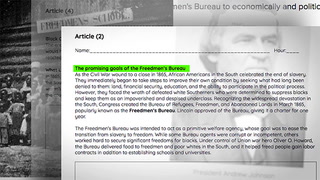
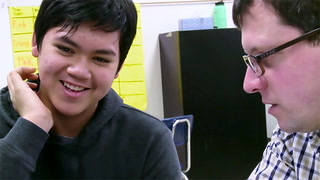
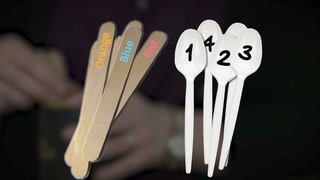
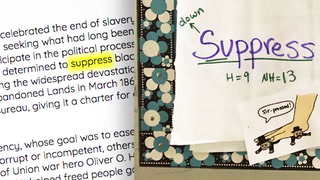
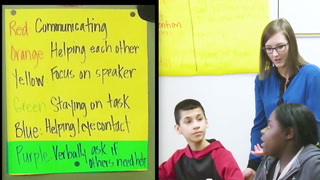









17 Comments
Sho-Yin Chen-Berry Feb 21, 2022 6:52pm
Mr. Knutson's role is to provide feedback to the students. The one-on-one conferencing is really powerful because he is giving formative assessment for each of the students and providing feedback to help them move forward.
Susan fulton Apr 20, 2021 5:39pm
1. His role is to facilitate conferences with students so he can give feedback.
2. First he begins with general questions then gets more specific to get the children thinking about the next steps t
in their project.
3. I teach preschool.
Markisha Harris Feb 24, 2021 11:35am
1. He is faciltiating the projects that the students are going to present in a walk through the following week.
2. General questions about the assignment, but then he moves into more specific type questions that have the students reference their next step to complete their work.
3. I use the one to one conference technique more in math, every Monday I return assignments that my students complete the previous week for correct and returns. The students must show me the work to be cleared by the end the week. I utilize that time to discuss misconceptions of how they worked it out, I use that time to also discuss which method they perfer to use to solve the equations.
Samuel Pedroza Jul 1, 2020 2:27am
What I learned from this video is how useful conferences with the teacher are for the students while also giving them a sense of being in control. It aids them to reach their goals for a particular assignment by giving helpful suggestions while letting them explore different possibilities. It also makes the student feel more important because they as an individual have the teachers full attention for several minutes, guiding them through their project.
Michael Burnett Jun 13, 2020 10:08am
His role is to facilitate conferences with students over their Civil War projects by letting the students take the lead in the conference.
At the beginning he is asking general questions about where the student is in their project. He then follows up with specific questions to get the student to articulate how to complete the step of the project they are on. This gets the student to think and plan how to get thru the project.
I regularly use one-on-one conferences in design classes. I think it would be useful in the lower level technical classes as well, where I have not used them before. There are concepts that students could better grasp in a one-on-one session.